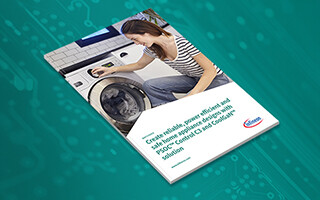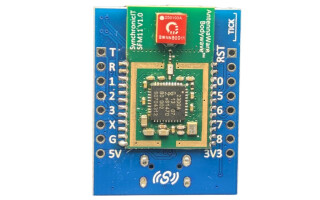Dev Kit Weekly: micro:bit V2
March 19, 2021
Video
One of the more noticeable features of the board is its 5x5 LED array that developers can use as a light sensor and a tiny screen that can be drawn on to display words, numbers, and other information. There is also a super cool touch-sensitive logo and two programmable tactile buttons that developers can use to operate the lights.
If you flip the board over, users will find everything that provides it with power and functionality, starting with a 64 MHz Arm Cortex-M4 microcontroller with FPU integrated into the Nordic Semiconductor nRF52833 multiprotocol SoC. Multiprotocol means that the SoC, which incorporates a radio capable of Bluetooth Direction Finding, supports short-range wireless connectivity in addition to Bluetooth 5.2, including BLE, Bluetooth Mesh, NFC, Thread, and Zigbee. On top of that connectivity and logic, the Nordic device contains 512 KB of Flash and 128 KB RAM for application development. Furthermore, the micro:bit v2 is also loaded with a number of sensing options, such as:
- Accelerometer
- Compass
- MEMS microphone
- Speaker
External components can be added via 25 gold-tabbed edge pins and five ring connectors, three of which are used for digital and analog I/O and the other two for power and ground. When programming the micro:bit v2 to take advantage of these components, you use either the onboard microUSB interface or a two-pin JST connector. However, it’s important to mention that it doesn’t include any cables or power sources. The company recommends purchasing a AAA battery holder for about $2 or a micro USB cable to power your board.
Aside from the physical features of the kit, the micro:bit v2 is packaged with a mobile app that allows users to send code to the board over Bluetooth, eliminating the need for the USB and JST interfacing altogether. This makes it a great way to get a classroom up and running with their STEM projects quickly. Another reason the kit is great for educational purposes is that it can be programmed in multiple languages including C++, micro:bit MakeCode, Python, and Scratch. MakeCode, for example, simplifies development by providing access to a library of “blocks” that convert to JavaScript for easy application development, as well as a simulator that can be used to test and execute programs directly in a browser.
For the price of $14.95 you can buy the micro:bit v2 from Newark, an Avnet Company. As usual, you can also enter this week’s raffle and try to win the one BBC micro:bit v2 that we’re giving away for absolutely free.
Well guys, thanks for watching this week’s dev kit weekly, it’s good to be back, we’ll see you next week.




